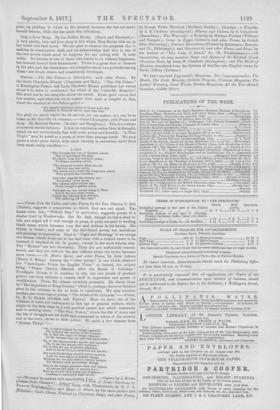Poxruv.—The Old Palace—a Retrospect ; with other Poems. By the
Lady Charlotte Blount. (Chapman and Hall.) "The Old Palace" is Kensington Palace, and Lady Charlotte Blount publishes her verses about it in order to counteract the offoot of the " Grevillo Memoirs." She must not be too sanguine about the result. Even good verses find few readers, and what are we to expect from such a couplet as this, about the sentinel at the Palace-gate ? — "Ho, mostly speaking, twice or thrice each day Presents, as Royalty drives past that way."
Nor shall we much regret tho ill-success, for our author, too, can be as hitter as Mr. Grevillo on occasion.—Saint Christopher, with Psalm and Song. By Maurice Baxter. (Hodder and Stoughton.) This is a volume of verse on sacred subjects. It fails in expression rather than in thought, which we not unfrequently find with some power and breadth. "A Wise Virgin" may be noted as a poem of more than average merit. Wo may quote a short piece which, with more mastery in execution, could have been made really excellent :-
A GM.
"She brought her box of Eastern scents, The oil perfumed His feet,' To others 'twas five hundred penoo, To Hint a worship sweet.
The prlsoned incense Oiled the air, The box was cast aside, The winds have borne the fragrance whore They preach the Crucified.
And who regards the broken jar ? ' Forgotten ' is its doom.
The incense shall exhale afar From Joseph's garden tomb.
Such gift we, too, would bring to Thee, And if the box must break, Accept the offering thus Bet free, The suffering for Thy sake."
—Voices from the Lakes, and other Poems, by the Rev. Charles D. Bell (Nisbet), suggests a comparison to which they are not equal. The blank-verse tale, "Wilfred Ray," in particular, suggests poems of a similar kind by Wordsworth. But Mr. Bell, though be has a story to tell, and might tell it well enough in prose, is quite unequal to writing blank verse, which becomes very fiat and tedious in his hands. His rhyme is better ; and some of the devotional poems are melodious and pleasing in expression. Such is "Night and Morning," if we except one stanza, which deals not in the best taste with a subject never to be touched, if touched at all, in poetry, except in the most solemn way. The "Hymns" are not successful, They are not sufficiently concen- trated, and they are without the fire without which the hymn becomes mere verse.--St. Malo's Quest, and other Poems, by John Adams (Henry S. King.) Among the "other poems" is ono which obtained the " Newdigate Prizes for English Verse" at Oxford, the subject being "Prince Charles Edward after the Battle of Culloden." Newdigate Prizes, it is needless to say, are not proofs of poetical genius, but they indicate a certain skill in expression and power of versification. These Mr. Adams certainly possesses. He shows them In "The Sepulture of King Gorrain," which is, perhaps, the most finished piece in the volume, as far as form is concerned. We may mention another also deserving of praise, " The Death of St. Columba."—Poems, by E. L. Floyer (Griffith and Ferran). Here we have one of the volumes of verse not unfrequont in this age of general culture, which might be the first steps in a real poetical career, but which commonly load to nothing more. "The Two Voices," where the life of peace and the life of struggle are set forth and contrasted in voices of the country and of the town, shows no little power. Wo quote a few stanzas from "Hidden Things ":— " Oh, to leave behind the things material !
Oh, to know the secrets of the Unseen Oh, to find the types of things ethereal,
In the dreams that are and that have boon Oh, to rise above earth's gloom and sadness 1 Oh, to see the beauty still unshovrn 1
Oh, to feel the joy of per feet gladness,
And to know God as ourselves are known !
But such knowledge cometh not to mortals, And we turn again to hidden things, Waiting till we pass earth's narrow portals, Till eternity ouch knowledge brings, Still in life bright glimpses flash and lighten All across the night of patient lovo ; Ever as we toil they beam and brighten,—
Leading to unclouded light above."
ithytnes by J. Brown —We must be content with mentioning Fit '
. • a ale of Lower Dereham, by (James Reid Glasgow); Talse ' 8° ;-1.717StOrls, with Illustrations, by H. J. A. Prances laughAtvi •"', :ler); and Heart to Heart, by the same author and fitaffeliei ; God's Chosen Foetival (a Christmas Song), and other Poems, by George Noble Plunkett (Mullany, Dublin); Llewelyn; a Tragedy, by A. E. Carteret (Remington); Rhymes and Chimes, by S. Colquhoun (Macmillan); The Weirwolf ; a Tragedy, by William Forster (Williams and Norgate); Ccesar in Egypt, Costanzct, and other Poems, by Joseph Ellis (Pickering); Poetical Recreations (Printed by Ballantyno, Hanson, and Co., Edinburgh); and SiO7'7128WOrth, and other Poems and Plays, by the Author of "Thy Gods, 0 Israel," &c. (R. Washbourne.)--Of translations, we may mention Songs and Hymns of the Earliest Greek Christian Poets, by Allen W. Chatfield (Rivingtons) ; and The Bride of Messina, translated from the German of Schiller into English verse, by Emily Milroy (Trtibner).






























 Previous page
Previous page